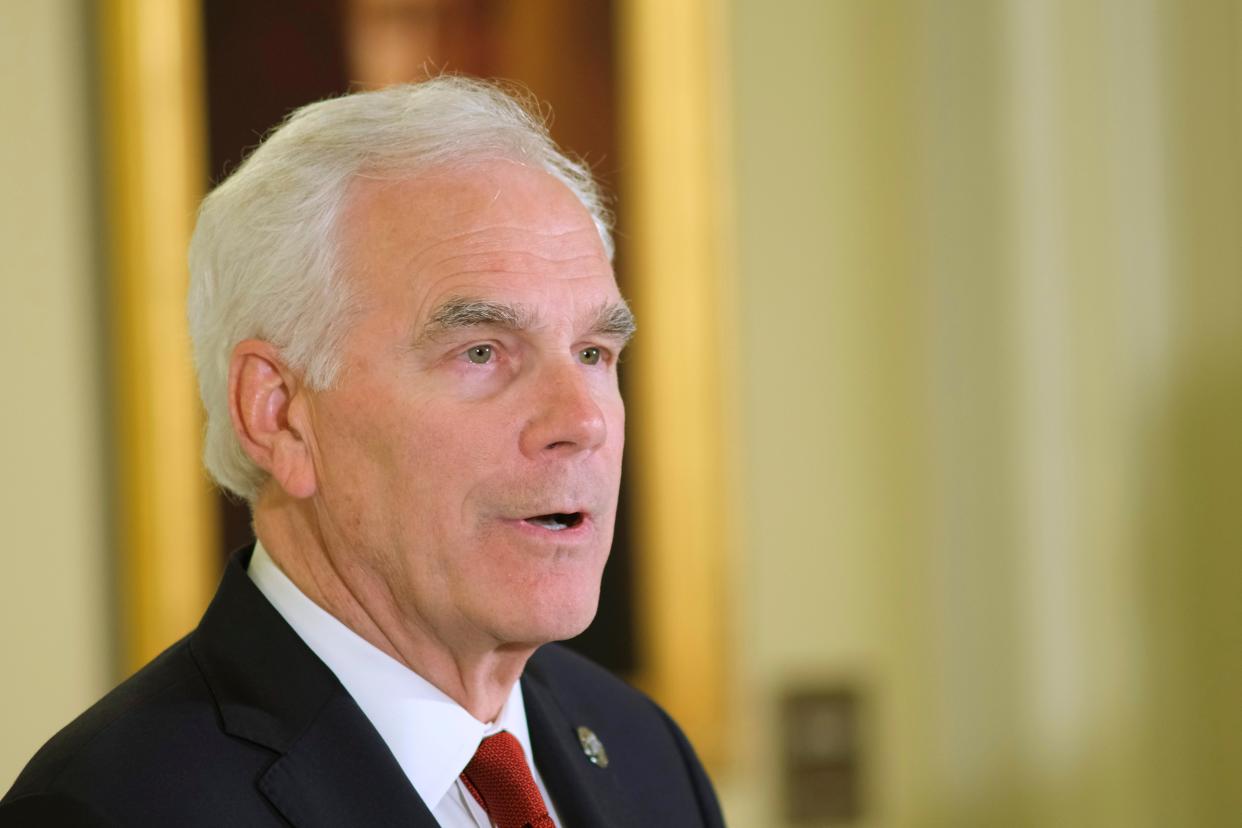Oklahoma AG pushes for more state prosecutions in Indian country

Oklahoma Attorney General John O’Connor told state prosecutors and local law enforcement agencies on Friday that they can start exercising an expanded authority over criminal cases involving non-Indians accused of crimes against Native Americans on Native land.
Citing a U.S. Supreme Court decision issued last month, the attorney general’s office said, “There is no longer any land within Oklahoma where a non-Indian defendant can escape justice.”
Law enforcement officers were advised to give state prosecutors first option — over U.S. attorneys — of filing charges in cases involving non-Indians accused of crimes against Native Americans on Native land. And state prosecutors also were advised to pursue cases that may not have been filed previously by U.S. attorney offices.
“Specifically, district attorneys should contact and coordinate with all law enforcement agencies within their jurisdiction to obtain records of any non-Indian defendants who were referred to the federal government but not prosecuted,” the memo states.
“Law enforcement officers should also notify district attorneys of any non-Indian defendants who were referred to the federal government but not prosecuted.”
Clint Johnson, U.S. attorney for the Northern District of Oklahoma, based in Tulsa, said Friday, “The U.S. Attorney’s Office for the Northern District of Oklahoma will continue to evaluate cases involving Native American victims in partnership with local district attorneys.
“This partnership will determine the best possible forum for criminal prosecution. The United States has concurrent jurisdiction with the State and has a longstanding trust responsibility with the Tribes. We will not abdicate that trust responsibility.”
The guidance from O’Connor comes in the wake of the Supreme Court ruling on June 29 that Oklahoma shares jurisdiction with the federal government in criminal cases on Native land in which the accused is a non-Native and the victim is a Native American.
The ruling, in the case of Victor Manuel Castro-Huerta, narrowed the scope of the court’s decision in McGirt v. Oklahoma, in 2020, which led to the affirmation of six reservations comprising most of eastern Oklahoma.
After the McGirt decision, U.S. attorneys and tribal prosecutors became responsible for all criminal cases involving Native Americans — as victims or perpetrators — on the reservations. And it led to many convictions being reversed.
The state of Oklahoma appealed some of the reversals involving non-Native defendants and Native American victims, arguing to the Supreme Court that Congress never specifically barred states from prosecuting non-Natives for crimes against Native Americans in Indian country.
The Supreme Court agreed, ruling 5-4 that the federal government and the state “have concurrent jurisdiction to prosecute crimes committed by non-Indians against Indians in Indian country.”
Muscogee (Creek) official calls for collaboration between state and tribes
Even before the McGirt ruling in 2020 resulted in six reservations being affirmed, the state generally did not seek to exercise criminal jurisdiction on Native land, such as land held in trust for tribes by the federal government. Casinos operate on trust land.
The Supreme Court opinion last month made no distinction between reservations and other types of land referred to as “Indian country” in federal law.
And O’Connor’s new memo says state prosecutors and law enforcement officers can pursue arrests and prosecutions against non-Natives who committed crimes against anyone “on all land in Oklahoma, including any land considered as Indian country in this context and any restricted allotments.”
Jason Salsman, a spokesman for the Muscogee (Creek) Nation, noted Friday that O’Connor, defeated in the June 28 Republican primary, was serving his last few months in office.
Salsman said, “Our office of Attorney General will be reaching out to the State to better understand the intentions and implications of this guidance that Oklahoma’s outgoing attorney general is distributing.
“Regardless of the new state jurisdiction wrongly conjured by the Supreme Court, the public interest is best served when the State and tribal nations work collaboratively. This is particularly important in cases where tribal nations continue to exercise jurisdiction on their lands over non-Indians who victimize Indians in crimes covered by the Violence Against Women Act. The fact that we have heard nothing about this directive from Attorney General O’Connor is saddening but unsurprising given his open hostility to any form of collaboration with tribal governments — a hostility that voters recently rejected.”
O’Connor was defeated by Tulsa attorney and businessman Gentner Drummond, who is expected to win the general election race against Libertarian Lynda Steele and take office in January.
The Five Tribes — the Cherokee, Chickasaw, Choctaw, Muscogee (Creek) and Seminole Nations — last month called the Supreme Court decision in the Castro-Huerta case “disconcerting and shocking” and noted that it would affect tribes outside of Oklahoma.
“As we enter this new chapter of concurrent jurisdiction, the Five Tribes will continue to seek partnership and collaboration with state authorities while expanding our own criminal justice systems,” the tribe said.
Indian law experts nationwide have also criticized the Castro-Huerta decision, arguing that it defied legal principles dating back to the 19th century.
The Supreme Court sent the Castro-Huerta case back to the Oklahoma Court of Criminal Appeals, which reversed Castro-Huerta’s conviction child neglect because the victim was Native American and the crime occurred on the Cherokee reservation. The state appeals court will have to re-examine the case and others like it to conform to the Supreme Court’s decision.
This article originally appeared on Oklahoman: Oklahoma attorney general seeking to exert muscle on Native land

